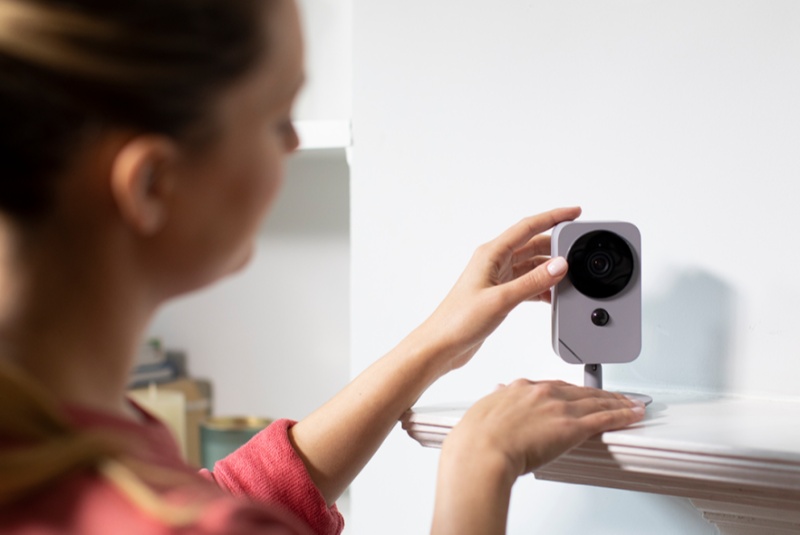If you want to monitor your home but you don’t have the money to pay for a professional setup then consider investing in a DIY home security system. DIY home security systems are just as good as regular security systems and you can save hundreds of dollars a year installing it yourself!
The Advantages of DIY Home Security Systems
DIY home security systems have gained popularity in recent years as an affordable and effective means of safeguarding homes and loved ones. These systems offer several benefits that make them a compelling choice for homeowners looking to enhance their security. In this article, we explore the advantages of using a DIY home security system.
1. Cost-Effective Security Solution
One of the primary benefits of opting for a DIY home security system is its cost-effectiveness. Traditional professionally installed security systems often come with hefty installation fees and monthly monitoring charges. In contrast, DIY systems are typically more affordable upfront, allowing homeowners to save money without compromising on security.
2. Easy Installation
DIY home security systems are designed with simplicity in mind, making them accessible to homeowners with varying levels of technical expertise. These systems come with user-friendly instructions and often require no professional installation. Homeowners can easily set up the system themselves, saving both time and money.
3. Customization Options
Another advantage of DIY home security systems is the flexibility they offer in terms of customization. Homeowners have the freedom to choose the specific components they need, such as motion sensors, door/window sensors, security cameras, and more. This customization allows homeowners to tailor their security system to their unique needs and preferences.
4. Wireless Technology
Many DIY home security systems utilize wireless technology, which simplifies installation and reduces the need for extensive wiring. Wireless systems are highly adaptable and can be easily expanded or relocated as needed. This flexibility ensures that homeowners can adapt their security system to accommodate changes in their living arrangements or security requirements.
5. Remote Monitoring and Control
Modern DIY home security systems often come with smartphone apps that enable remote monitoring and control. Homeowners can access their security system from anywhere, allowing them to check the status of sensors, view live camera feeds, and receive real-time alerts on their mobile devices. This remote access provides peace of mind and enhances convenience.
6. No Long-Term Contracts
Many professional security companies require homeowners to sign long-term monitoring contracts, which can be burdensome. DIY home security systems typically do not involve such contracts. Homeowners have the flexibility to choose whether they want to subscribe to monitoring services, and they can cancel at any time without incurring penalties.
7. Immediate Alerts
DIY home security systems are designed to provide immediate alerts in the event of suspicious activity or security breaches. Whether it’s a door or window sensor triggering an alert or motion detection cameras capturing unusual movement, homeowners can receive instant notifications via their smartphone. This prompt notification allows for quick action, such as contacting the authorities or verifying the situation remotely.
8. Integration with Other Smart Devices
Many DIY home security systems are compatible with other smart home devices, creating a seamless and integrated home automation ecosystem. Homeowners can connect their security system to smart locks, lighting, thermostats, and voice-controlled assistants. This integration enhances convenience and allows for more comprehensive home automation.
9. Increased Deterrence
The presence of a visible home security system, even a DIY one, acts as a deterrent to potential intruders. Security signs, stickers, and visible cameras send a clear message that the home is protected. This alone can discourage criminals from attempting a break-in, making the home a less attractive target.
10. Lower Insurance Premiums
Many insurance companies offer discounts on homeowners’ insurance premiums for properties with security systems in place. Installing a DIY home security system can lead to reduced insurance costs, which can help offset the initial investment. Homeowners should check with their insurance provider to determine the specific discounts available.
11. Peace of Mind
Ultimately, the most significant benefit of using a DIY home security system is the peace of mind it provides. Knowing that your home is protected and that you have the ability to monitor and control your security remotely offers a sense of security and reassurance that is invaluable.
Conclusion
In conclusion, DIY home security systems offer a cost-effective, customizable, and user-friendly solution to protect homes and loved ones. Their flexibility, wireless technology, and remote monitoring capabilities make them a practical choice for homeowners seeking to enhance their security. Additionally, the integration with other smart devices and the potential for insurance savings further solidify the advantages of using a DIY home security system. Ultimately, the peace of mind that comes with knowing your home is secure is perhaps the most compelling reason to consider this modern approach to home security.


